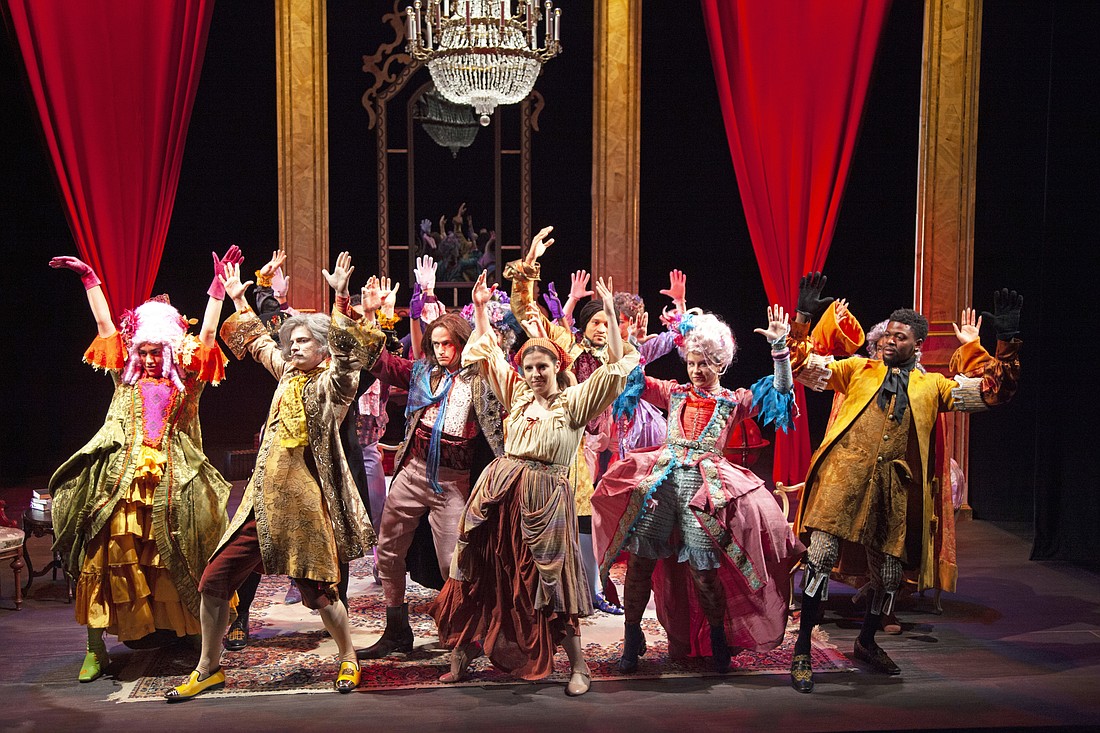- November 23, 2024
-
-
Loading

Loading

The play opens to the harmonies of Pachelbel’s Canon in D. The elaborately costumed actors sedately gyrate like figures on an ornamental clock. The music abruptly shifts to the blistering electric guitar of Metallica’s “Enter Sandman.” The actors instantly bump, grind and boogie. And you definitely know this isn’t your grand-père’s Molière.
The year is 1672; a fad for intellectual self-improvement is sweeping the land of France. Les précieuses championed philosophical refinement, Platonic love and classically informed witticisms. Many Frenchmen (Molière included) mocked this fad; its members were mostly women. Molière’s play revolves around three “learned ladies” in a bourgeoisie household who’ve embraced this trend.
Philaminte (Imani Lee Williams) is the domineering matriarch. Her oldest daughter, Armande (Erin O’Connor), and her sister-in-law, Bélise (Macaria Chaparro Martinez), have all decided to improve their minds. Trissotin (Christian Douglass) is happy to help. This lousy poet and pseudo-intellectual con artist has installed himself as the family’s in-house guru.
Urged on by his ivory tower babble, Philaminte fires Martine (Sydney Story), the first-class kitchen maid, for the sin of bad grammar.
Bad move, but she’s just getting started.
Chrysale (Joe Ayers) is officially the man of the house, but he’s a powerless patriarch. Ariste, his tough-minded brother, urges him to take a stand. But Chrysale keeps his opinions to himself. That changes when Philamente decides to marry Henriette (Zoya Martin), their youngest daughter, to Trissotin. She’s in love with the down-to-Earth Clitandre (Peter Raimondo).
Daddy approves of Clitandre’s proposal to Henriette. But Mommy won’t back down. It looks like Henriette will be stuck in a miserable marriage to Trissotin — and the con artist will walk off with a hefty dowry.
Director Benny Sato Ambush gives this electrified tale the pace of screwball comedy. These characters are a fast-talking bunch. But acceleration never fights comprehension. Rapid-fire or not, the dialogue’s always distinct.
The bubbling speech sparkles like Champagne, thanks to an excellent rhyming translation by poet Richard Wilbur.
But in this production, there’s more to the comedy than words.
The play opens with a dance. In a way, it’s all dance.
Choreographer and movement designer Eliza Ladd punctuates the sparkling verbiage with physical comedy. Bits of business include the precisely timed flip of a lady’s fan or Henriette’s chair-shifting attempts to scoot as far away from the bloviating Trissotin as possible. Ladd’s hilarious movements perfectly complement Molière’s hilarious meanings. Brava!
Molière loved to convey a dense sense of France’s social order (and disorder).
The 13 conservatory actors nicely embody the strata of class and caste. Douglass’ Trissotin is more of a wannabe rock star than a fop. He’s the definition of a self-important poseur. He waves his walking stick and speaks with pompous theatricality. (Harvey Korman comes to mind.) A brilliantly comic performance!
Williams’ Philaminte is a domineering thunderstorm waiting to happen. O’Connor’s Armande is a ball of self-deception. She thinks she’s above fleshly pleasures and the degrading institution of marriage. But admit it or not, she still has a carnal side. And thinks every man on the planet is secretly in love with her — especially Clitandre. Martinez’s Bélise inhabits a similar delusional architecture.
As to the sane members of the household: Ayers’ Chrysale does his best to stay on his wife’s good side, though she really doesn’t have one. Story’s plainspoken Martine has a similar problem as the long-suffering kitchen maid.
Raimondo and Martin are both excellent as the levelheaded young lovers constantly thwarted by muddleheaded minds. Wheat’s Ariste is a man of action, not words. He doesn’t berate his brother for his lack of action. He simply acts — and saves the day.
Kudos also to the other cast members for bringing this precious madhouse to life.
This production makes no attempt at naturalism. The French nobility didn’t dress like that in the 17th century; their houses didn’t look like that. Here, the costumes look like costumes; the stage set looks like a set. The artificiality is intentional — and hilarious.
Dee Sullivan dresses the women in a rainbow of high-rise wigs and multilayered frippery. The men’s garb is relatively restrained, with the exception of Trissotin. Sporting anachronistic sunglasses and 20 pounds of multicolored embroidery, he resembles a fugitive from Sgt. Pepper's Lonely Hearts Club Band. Jeffrey Weber’s set is a serenely balanced classical order that’s been overwhelmed by books, art, telescopes and other instruments of the mind. It feels like an invasion — and it is.
Ultimately, this play’s about Trissotin’s attempted takeover of this household.
Like Tartuffe before him, he’s a fraud exploiting an intellectual fad and attempting to marry his way into wealth. In the end, sensible Ariste out-cons the con artist. A phony philosopher is no match for the real thing.
The play’s battle between practical sense and precious sensibility is comedy gold. Laughter aside, it’s still a war of ideas. Trissotin is a caricature of France’s real-life intellectuals and influencers.
(And one particular charlatan named Charles Cotin.)
Les précieuses weren’t all hucksters. Some were sophists, others true philosophers.
Either way, they shared a definite belief system.
Philosophically, these precious devotees had a Platonic worldview. In the play, they constantly speak of rising above coarse, earthly concerns to heavenly realms of pure thought.
Molière opposes that with a balance of heaven and earth. To quote Henriette …
“Your brilliant mind would never know its start, had mother not, with head, have had some heart. And it was good for you, dear, that she wed, and not just brought philosophy to bed!
Simply put, les précieuses have too much heaven on their minds.
Molière’s mind champions common sense. He’s not an anti-intellectual. Or (in my opinion) anti-feminist.
Set your mind on things above. Molière would approve.
But don’t forget what’s cooking on the stove. Or who’s sharing your bed.